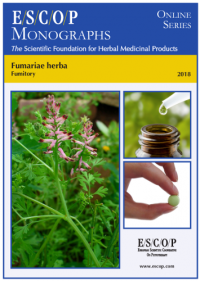
ESCOP monographs The Scientific Foundation for Herbal Medicinal Products. Online series. Fumariae herba (Fumitory). Exeter: ESCOP; 2018.
Fumariae herba
Fumitory
Fumaria officinalis L.
Published 2018
Format: PDF
Online viewing (for only ¤30 per year, you can view online all the monographs)
SUMMARY:
The herbal monograph selects and summarises scientific
studies and textbooks regarding efficacy, dosage and safety to support
the therapeutic uses of fumitory.
This herbal drug by definition consists of dried aerial parts of Fumaria officinalis L.
Studies with its main characteristic constituents isoquinoline
alkaloids of the protopine, spirobenzylisoquinoline, protoberberine,
benzophenanthridine and indenobenzazepine types, also fumaric and malic
acids are included.
The therapeutic indications are digestive complaints (e.g.
stomach ache, nausea, vomiting, feeling of fullness, flatulence) due to
hepatobiliary disturbance.
Administration of fumitory addresses posology; its duration of
use; contra-indications; special warnings; special precautions for use;
interactions with other medicinal products; other forms of interaction;
in pregnancy and lactation; its effects on ability to drive; undesirable
effects; overdose.
In vitro experiments with fumitory demonstrated smooth
muscle-relaxing effects, effects on the bile duct as well as
antibacterial, antioxidant and neuroprotective effects.
In vivo experiments with fumitory or its extracts demonstrated
hepatobiliary, diuretic, choleretic properties, reduction of gallstones
and prevention of arrhythmia in animal models.
Pharmacological studies in humans observed effects on choleresis and normalization of bile flow.
Controlled clinical studies with fumitory demonstrated its use
in patients with biliary disorders of various origin. Overall
improvements of symptoms in these studies was excellent or good.
Preclinical safety data were assessed in toxicity studies.
Safety data were assessed in human studies. Tolerability of the treatments was very good, only minor adverse events were reported.
The selection of literature cited in the monograph is aimed at bringing
together relevant information about the possible physiological roles of
fumitory and its major constituents.
KEYWORDS:
- Fumaria officinalis L.
- Fumariae herba
- Fumitory
- Digestive complaints (e.g. stomach ache, nausea, vomiting, feeling of fullness, flatulence) due to hepatobiliary disturbance



